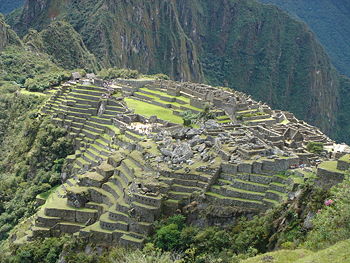Machu Picchu: Difference between revisions
Jump to navigation
Jump to search

imported>Joe Quick mNo edit summary |
mNo edit summary |
||
| (6 intermediate revisions by 2 users not shown) | |||
| Line 1: | Line 1: | ||
{{subpages}} | {{subpages}}{{Image|Machu Picchu from above.jpg|right|350px|Machu Picchu as seen from a neighboring peak.}} | ||
'''Machu Picchu''' is an [[archeology|archaeological]] site in the [[Andes]] just northwest of [[Cusco]], [[Peru]]. It was built by the [[Inca]]s in about 1450 AD and is thought to have served as a sort of royal estate for the emperor. The site was abandoned at about the time of Spanish conquest but escaped the destruction that was wreaked on other Inca sites by the conquistadors. Rediscovered by [[Hiram Bingham]] in 1911, the site has become an enormously popular tourist destination, drawing hundreds of thousands of visitors every year. It is a UNESCO World Heritage | '''Machu Picchu''' is an [[archeology|archaeological]] site in the [[Andes]] just northwest of [[Cusco]], [[Peru]]. It was built by the [[Inca]]s in about 1450 AD and is thought to have served as a sort of royal estate for the emperor. The site was abandoned at about the time of Spanish conquest but escaped the destruction that was wreaked on other Inca sites by the conquistadors. Rediscovered by [[Hiram Bingham]] in 1911,<ref>Recent studies suggest that the site may actually have been explored by German business man Augusto Berns somewhat earlier. See the AP archive [http://www.aparchive.com/OneUp.aspx?rids=c3d874d5f667659ceb635d3b60ac3bb1 here]</ref> the site has become an enormously popular tourist destination, drawing hundreds of thousands of visitors every year. It is a [[UNESCO]] designated [[World Heritage site]].<ref>See the UNESCO website at http://whc.unesco.org/en/list/274</ref> | ||
==Notes== | ==Notes== | ||
<references /> | <references />[[Category:Suggestion Bot Tag]] | ||
Latest revision as of 11:01, 14 September 2024
Machu Picchu is an archaeological site in the Andes just northwest of Cusco, Peru. It was built by the Incas in about 1450 AD and is thought to have served as a sort of royal estate for the emperor. The site was abandoned at about the time of Spanish conquest but escaped the destruction that was wreaked on other Inca sites by the conquistadors. Rediscovered by Hiram Bingham in 1911,[1] the site has become an enormously popular tourist destination, drawing hundreds of thousands of visitors every year. It is a UNESCO designated World Heritage site.[2]
Notes
- ↑ Recent studies suggest that the site may actually have been explored by German business man Augusto Berns somewhat earlier. See the AP archive here
- ↑ See the UNESCO website at http://whc.unesco.org/en/list/274
